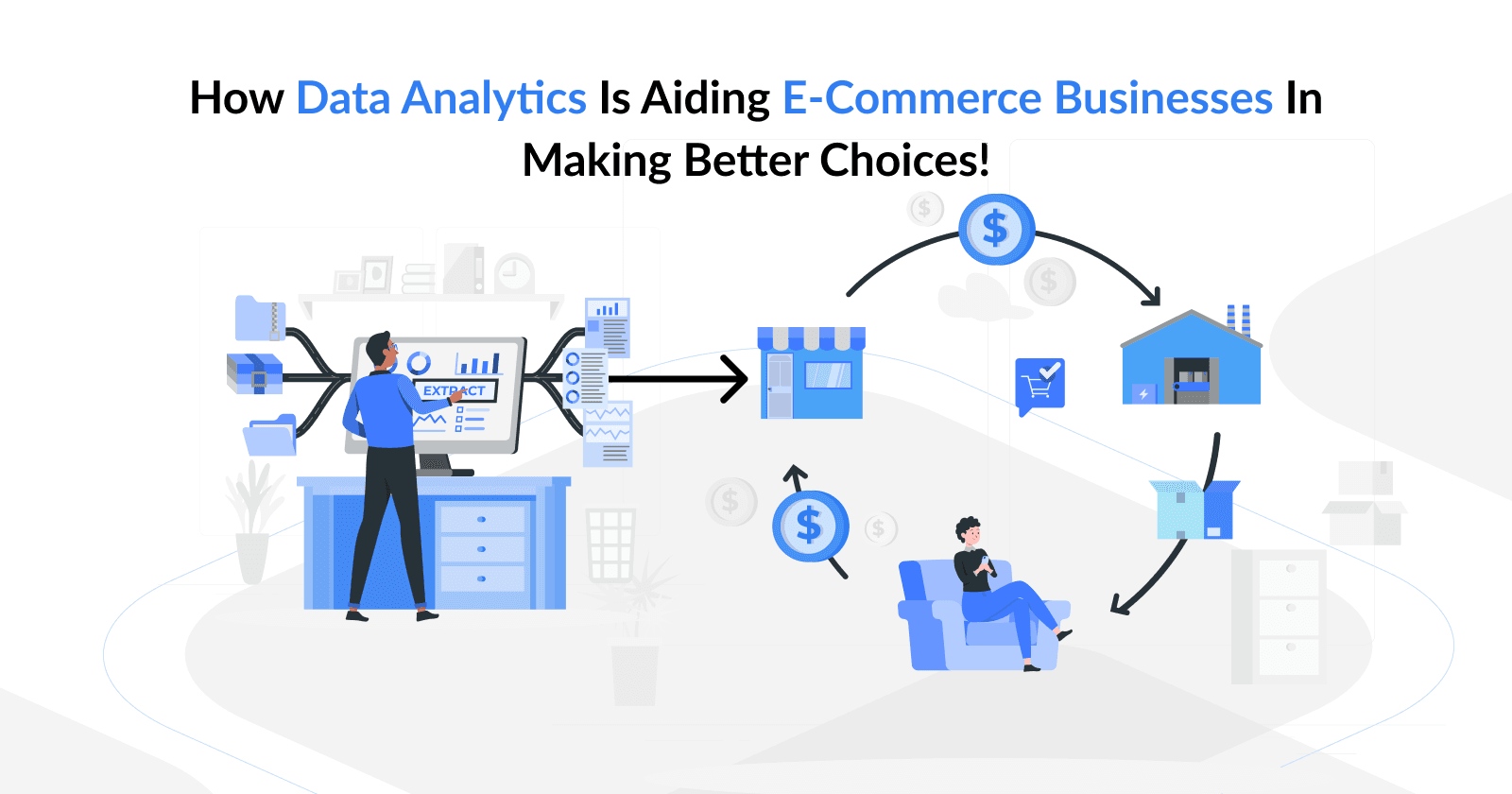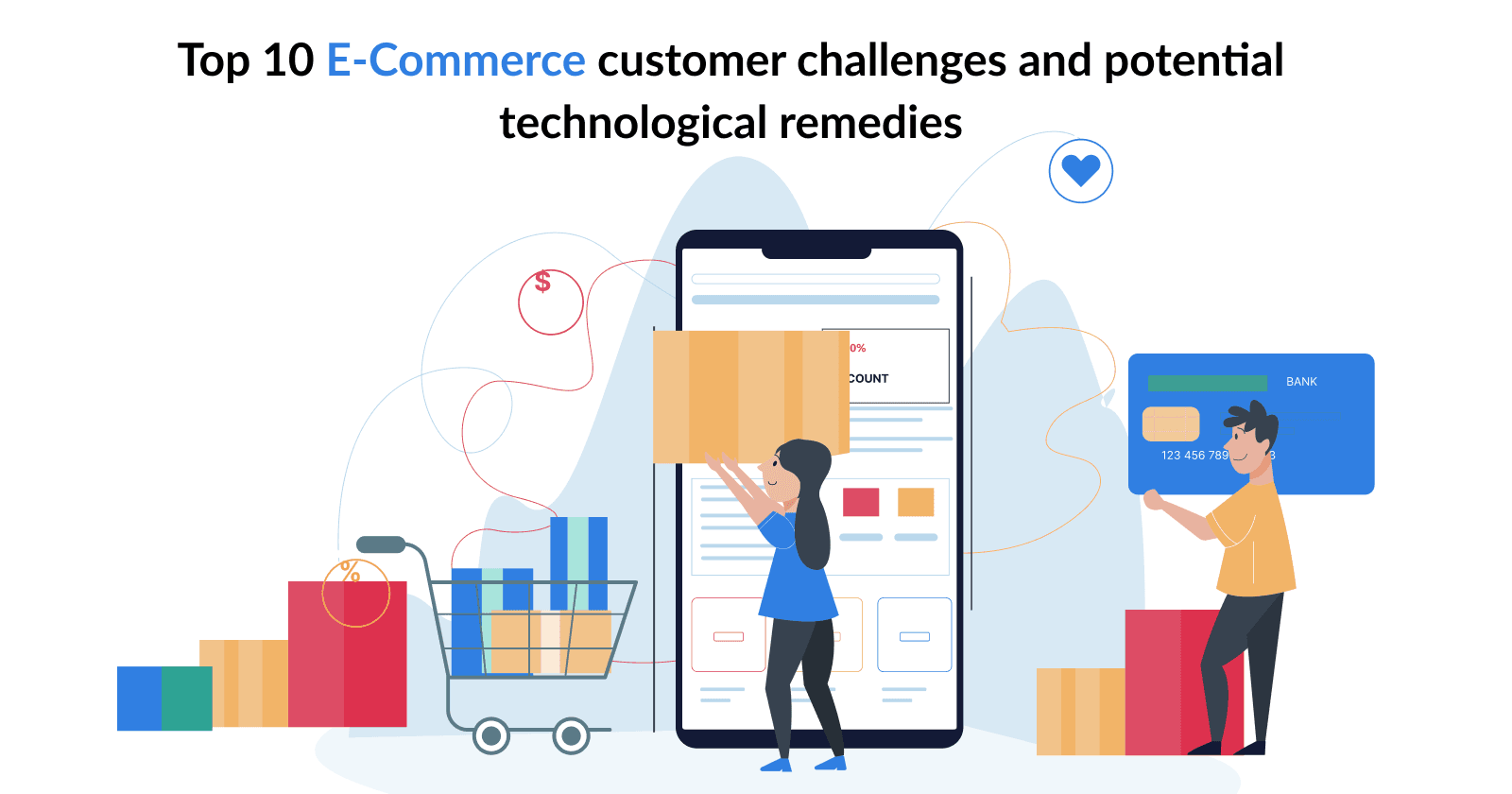Introduction
Artificial Intelligence (AI) is rapidly transforming the world of e-commerce, with a significant impact on customer service and sales. AI-powered solutions enable retailers to improve their customer service quality, increase customer engagement, enhance customer satisfaction, and boost sales.
Artificial Intelligence (AI) is rapidly transforming the world of e-commerce, with a significant impact on customer service and sales. AI-powered solutions enable retailers to improve their customer service quality, increase customer engagement, enhance customer satisfaction, and boost sales. However, there are also challenges and concerns associated with AI in e-commerce, such as ethical considerations and job displacement.
In this blog, we will discuss the impact of AI on e-commerce customer service and sales, including its benefits, challenges, and opportunities.
Benefits of AI in E-commerce Customer Service and Sales
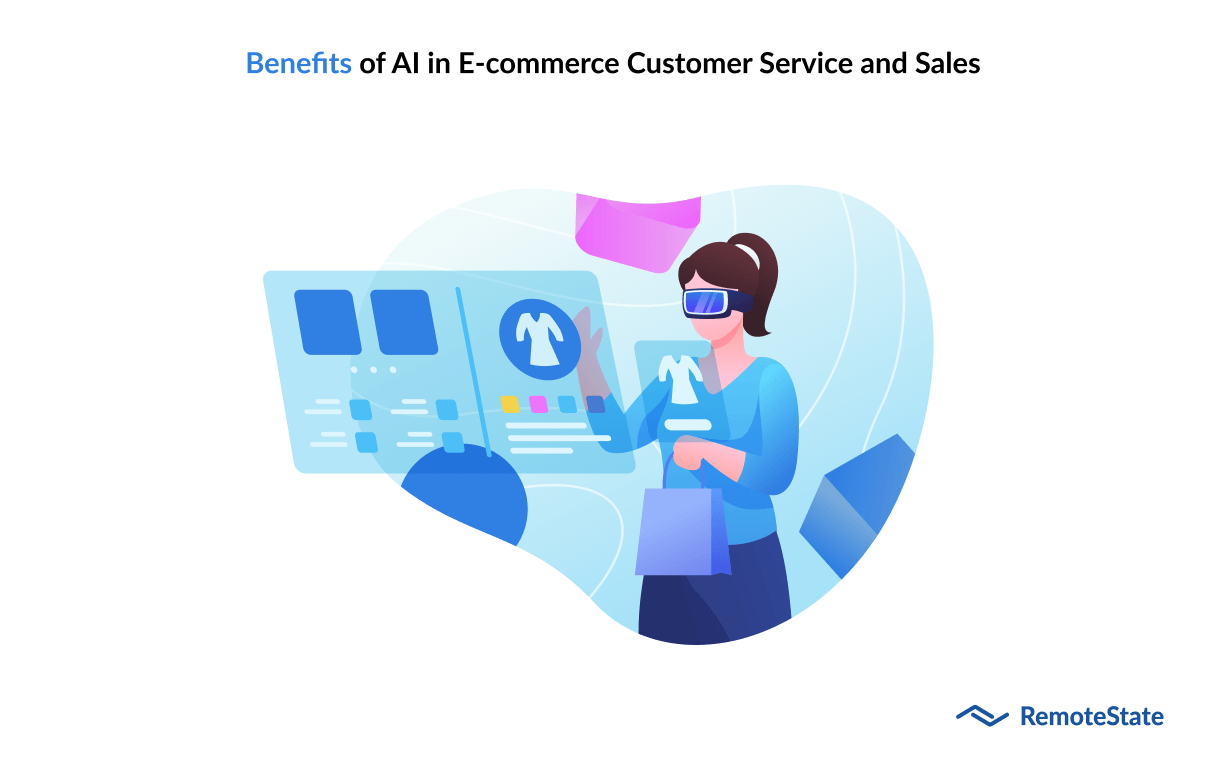
Personalization
AI can provide a more personalized experience for customers by analyzing their shopping behavior, preferences, and history. AI algorithms can use this data to make personalized recommendations, offer targeted promotions, and suggest products that customers are likely to purchase. This can improve the customer experience and increase sales by creating a more tailored shopping experience.
Improved Customer Service
AI-powered chatbots and virtual assistants can offer 24/7 customer support and provide immediate assistance to customers, enhancing customer satisfaction. Chatbots can answer frequently asked questions, resolve issues, and direct customers to the appropriate resources. AI-powered solutions can also handle multiple customer queries simultaneously, freeing up human resources to focus on more complex issues.
Enhanced Inventory Management
AI can optimize inventory management by analyzing customer demand patterns and predicting future trends. This can help retailers to maintain optimal stock levels and reduce the risk of overstocking or understocking. AI can also automate the ordering process, ensuring that products are replenished in a timely and cost-effective manner.
Fraud Detection and Prevention
AI can help retailers to detect and prevent fraud by analyzing customer behavior and identifying suspicious activity. AI algorithms can detect anomalies in purchase patterns, flagging potentially fraudulent transactions for review. This can prevent financial losses for retailers and enhance customer trust and confidence.
Improved Product Recommendations
AI can enhance product recommendations by analyzing customer behavior and preferences. AI algorithms can use this data to suggest complementary products, upsell and cross-sell products, and recommend products that customers are likely to purchase. This can increase sales and improve the customer experience by providing relevant and useful product recommendations.
Better Marketing Insights
AI can provide retailers with valuable marketing insights by analyzing customer behavior and preferences. AI algorithms can identify customer segments, analyze customer feedback, and predict customer behavior. This can help retailers to develop more effective marketing strategies and improve customer engagement.
Challenges and Concerns of AI in E-commerce Customer Service and Sales
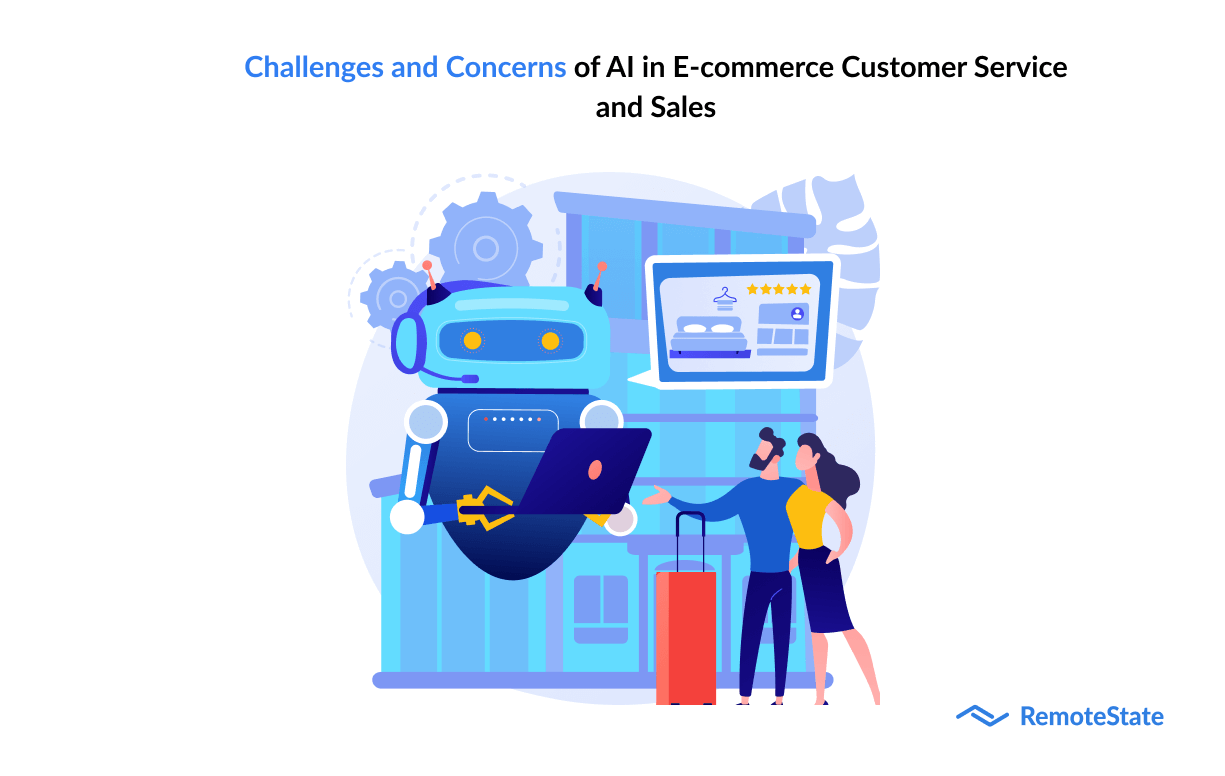
Ethical Considerations
As AI becomes increasingly prevalent in e-commerce, there are ethical concerns regarding the use of customer data and privacy. Retailers must ensure that they are transparent about their data collection and usage policies and that they are complying with relevant data protection laws. There is also a risk of bias in AI algorithms, which can result in discriminatory practices and perpetuate existing social inequalities.
Job Displacement
AI-powered solutions can automate many routine tasks, which can lead to job displacement for human customer service agents. Retailers must consider the impact of AI on their workforce and ensure that they are providing adequate training and support for their employees. There is also a need to develop new job roles and skills to support the development and implementation of AI-powered solutions.
Technical Challenges
AI-powered solutions can be complex and require significant technical expertise to implement and maintain. Retailers must ensure that they have the necessary technical capabilities to deploy and manage AI solutions effectively. This can involve significant investment in infrastructure, software, and personnel.
Cost
AI-powered solutions can be expensive to develop and implement, particularly for smaller retailers. The cost of AI solutions can be a barrier to entry for some retailers, limiting their ability to compete with larger retailers who have greater resources and expertise.
Opportunities of AI in E-commerce Customer Service and Sales
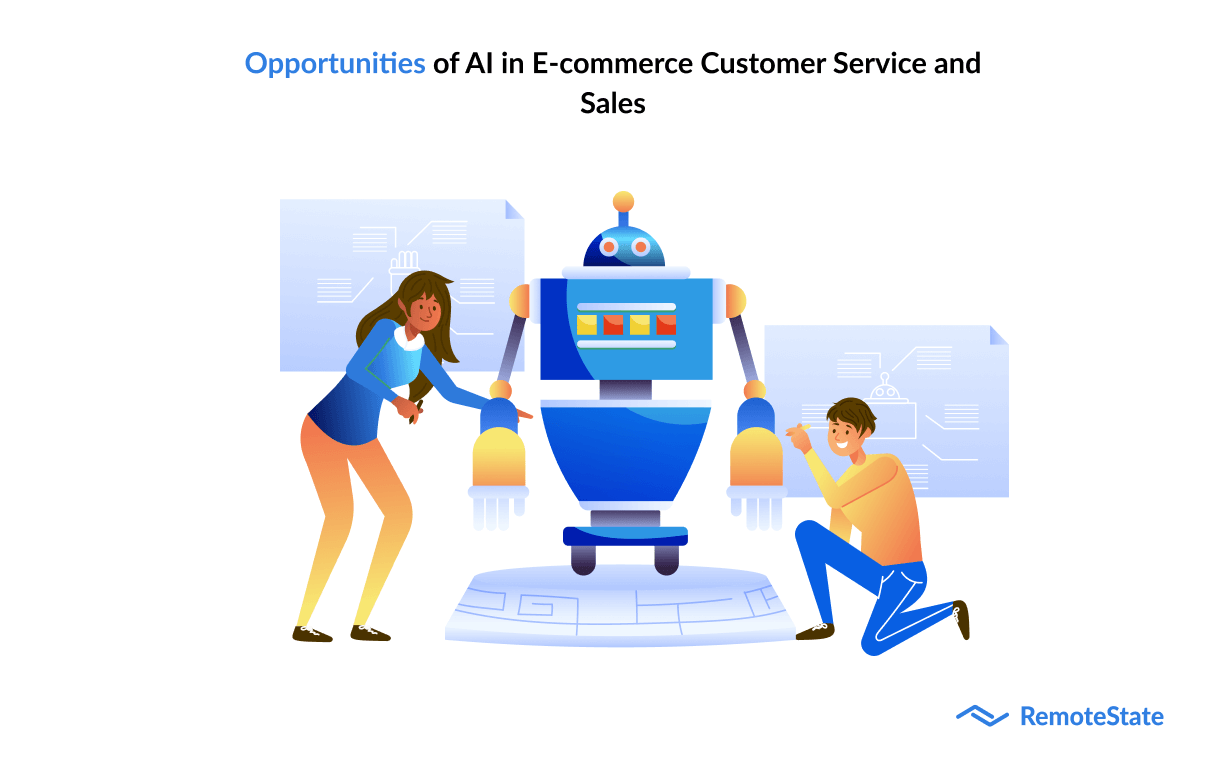
Competitive Advantage
AI-powered solutions can provide retailers with a competitive advantage by enabling them to offer a more personalized and efficient shopping experience. This can enhance customer satisfaction and loyalty, ultimately leading to increased sales and revenue.
Improved Efficiency and Productivity
AI can automate many routine tasks, freeing up human resources to focus on more complex issues. This can improve efficiency.
New Revenue Streams
AI-powered solutions can enable retailers to develop new revenue streams, such as subscription-based services or personalized product recommendations. This can help retailers to diversify their revenue streams and increase their profitability.
Improved Supply Chain Management
AI can optimize supply chain management by analyzing data on customer demand, inventory levels, and delivery times. This can help retailers to reduce costs, minimize waste, and improve the speed and accuracy of product delivery.
Conclusion
AI has a significant impact on e-commerce customer service and sales, offering numerous benefits, challenges, and opportunities for retailers. AI-powered solutions can improve personalization, enhance customer service, optimize inventory management, prevent fraud, and provide valuable marketing insights.
However, there are also challenges and concerns associated with AI, such as ethical considerations, job displacement, and cost. Retailers must carefully consider these factors when developing and implementing AI-powered solutions. Overall, AI has the potential to transform the e-commerce industry, providing retailers with a competitive advantage and enabling them to offer a more efficient and personalized shopping experience.
Revolutionize Your E-commerce Business with AI-powered Solutions from Remotestate!
Remotestate can offer customized AI-powered solutions to e-commerce retailers to improve their customer service and sales. They can analyze the specific needs and challenges of each retailer and develop tailor-made solutions that suit their business goals and requirements. This can enable retailers to optimize their operations, enhance customer satisfaction, and ultimately drive sales and revenue.
FAQs
How can AI improve customer service in e-commerce?
AI-powered chatbots and virtual assistants can provide 24/7 customer support, answer frequently asked questions, and direct customers to the appropriate resources. This can enhance customer satisfaction and free up human resources to focus on more complex issues.
What are the ethical considerations associated with AI in e-commerce?
There are concerns regarding the use of customer data and privacy, as well as the risk of bias in AI algorithms, which can result in discriminatory practices and perpetuate existing social inequalities. Retailers must ensure that they are transparent about their data collection and usage policies and that they are complying with relevant data protection laws.
How can AI enhance inventory management in e-commerce?
AI can optimize inventory management by analyzing customer demand patterns and predicting future trends. This can help retailers to maintain optimal stock levels, reduce the risk of overstocking or understocking, and automate the ordering process to ensure that products are replenished in a timely and cost-effective manner.
How can AI improve product recommendations in e-commerce?
AI algorithms can analyze customer behavior and preferences to suggest complementary products, upsell and cross-sell products, and recommend products that customers are likely to purchase. This can increase sales and improve the customer experience by providing relevant and useful product recommendations.
What opportunities does AI offer for e-commerce retailers?
AI-powered solutions can provide retailers with a competitive advantage, improve efficiency and productivity, offer new revenue streams, provide valuable marketing insights, and optimize supply chain management.
Publication Date
2023-05-12
Category
E-Commerce
Author Name
Rahul Agrawal
